 Heritage Crafts and the Costume Society have joined forces to launch two training bursaries to ensure that new and early-career fashion textile makers have the skills they need to succeed.
Heritage Crafts and the Costume Society have joined forces to launch two training bursaries to ensure that new and early-career fashion textile makers have the skills they need to succeed.
Many people are dissuaded from training in the hand skills of fashion textiles because of the cost, and therefore the make-up of the sector is not truly representative of the UK as a whole. This bursary has been set up to help cover or subsidise the training of someone who would otherwise be prevented from pursuing this career path as a result of the cost.
 They could be just starting out on your journey in fashion textiles, or at the point where they want to turn a hobby into a career, or they could already be a maker or designer who is looking to further develop their hand skills.
They could be just starting out on your journey in fashion textiles, or at the point where they want to turn a hobby into a career, or they could already be a maker or designer who is looking to further develop their hand skills.
Fashion textile crafts can include, but are not limited to, dressmaking, tailoring, pattern cutting, hat making, millinery, glovemaking, fabric pleating, corset making, etc. Applications for training that prioritises the acquisition of practical hand skills will be favoured over training that is predominantly theoretical or design-oriented.
If you are new to the craft and you would like assistance with finding a trainer, please get in touch and we will do what we can to help. The two successful applicants will benefit from up to £4,000 in funding each, and be supported by the Heritage Crafts team to help them achieve their aims. For more information on how to apply for the bursaries (deadline 23 February 2024) visit https://heritagecrafts.org.uk/fashion-textile-bursaries/.
The Costume Society is a UK membership organisation formed in 1964 to promote the study and preservation of historic and contemporary dress. Its new partnership with Heritage Crafts will also see a brand-new Fashion Textile Maker of the Year Award launched this summer, with a £2,000 prize and a trophy to be presented at a special Winners’ Reception in November.
The fashion textiles bursaries announced today sit alongside others in precious metal skills (supported by The Royal Mint) and musical instrument making (supported by the Golsoncott Foundation and Jennifer Chen). Additional bursaries for other crafts will open in May.
Prof Natascha Radclyffe-Thomas, Vice Chair of the Costume Society, said:
“The Costume Society is delighted to be launching two new training bursaries and a new Fashion Textile Maker of the Year Award in collaboration with Heritage Crafts to mark our 60th anniversary year. The bursaries and award extend the Costume Society’s mission to support the study and promotion of historic and contemporary dress by enhancing and protecting the skills of makers that are so central to fashion textiles. These opportunities are made possible by a legacy from founder member Anne Thomas, who worked tirelessly to celebrate excellence in makers and making.”
Jay Blades MBE, Co-Chair of Heritage Crafts, said:
“At Heritage Crafts we believe that great design is rooted in hand skill, so that designers can fully understand the properties and behaviours of materials, and appreciate the labour and skill involved in using them to produce garments and accessories. We are delighted to be working with the Costume Society to bring fashion textile skills to talented individuals who wouldn’t otherwise have the opportunity to develop them.”
Photo: © Leeds Museums and Galleries; photograph by Sara Porter.
Deadline: 5pm on Friday 23 February 2024
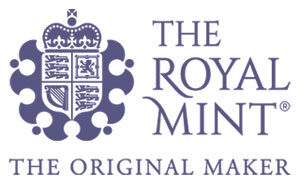 This training bursary is targeted at trainees and prospective trainees of crafts involving precious metals who are experiencing financial hardship. It is sponsored by The Royal Mint and is one of a suite of awards and bursaries offered by Heritage Crafts to support and celebrate heritage craftspeople.
This training bursary is targeted at trainees and prospective trainees of crafts involving precious metals who are experiencing financial hardship. It is sponsored by The Royal Mint and is one of a suite of awards and bursaries offered by Heritage Crafts to support and celebrate heritage craftspeople.
Apply for up to £4,000 to start training in a precious metal craft or to further develop your skills.
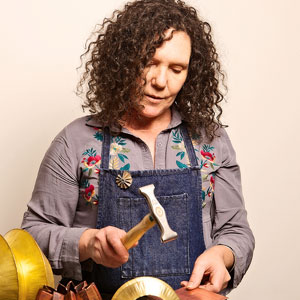 Many people are dissuaded from training in precious metal heritage crafts because of the cost, and therefore the make-up of the sector is not truly representative of the mix of backgrounds that make up the UK as a whole. This bursary has been set up to help cover or subsidise the cost of training for someone who would otherwise be prevented from pursuing this career path as a result of the cost.
Many people are dissuaded from training in precious metal heritage crafts because of the cost, and therefore the make-up of the sector is not truly representative of the mix of backgrounds that make up the UK as a whole. This bursary has been set up to help cover or subsidise the cost of training for someone who would otherwise be prevented from pursuing this career path as a result of the cost.
You could be just starting out on your journey in precious metal crafts or at the point where you want to turn a hobby into a career, or you could already be a maker who is looking to further develop your precious metal craft skills.
Precious metals crafts are those which feature precious metal as a primary material. They can include but are not limited to jewellery making, silversmithing, coppersmithing, gilding, hand engraving, medal making, silver spinning, metal thread embroidery, engine turning (guilloché), concert flute making.
If you are new to a craft and are struggling to find the right training for you, after your own research, please get in touch and we may be able to support. Successful applicants will be supported by the Heritage Crafts team to develop an action plan. We will work with you to monitor progress and support you to achieve your aims.
What can this grant be used for?
There are a number of routes to learning a craft skill. Applicants can apply for a grant for any amount up to £4,000 which can cover or contribute towards:
- the costs of training with a craftsperson;
- the costs of attending a specialist training course;
- the costs of attending an accredited training course;
- undertaking a self-directed programme of training with one or more craftspeople;
- the cost of specialist tools or materials, books or study materials or low cost travel (no more than 25% of total budget).
The bursary cannot be used for general living expenses, research, promotional activities or anything else. Successful applicants will be supported by the Heritage Crafts team. We will work with to you monitor progress and support you to achieve your aims.
How to apply
Please apply by filling out the form below. We will also accept a video application of no more than 15 minutes in length in which you address all of the questions in the form below. You can access a list of questions here.
The deadline for applications is 5pm on Friday 23 February 2024. If you have any questions or need assistance with the application process, please email Tess Osman at tess@heritagecrafts.org.uk.
Assessment, shortlisting and final selection will be carried out by the Heritage Crafts judging team, and interviews will be carried out by Zoom. If you are new to a craft and you would like assistance with finding a trainer, please get in touch and we will do what we can to help.
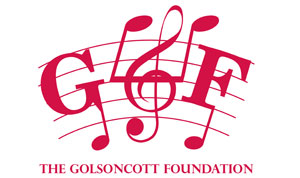 Deadline: 5pm on Friday 23 February 2024
Deadline: 5pm on Friday 23 February 2024
This training bursary is targeted at trainees and prospective musical instrument making trainees who are experiencing financial hardship. It is sponsored by the Golsoncott Foundation and Jennifer Chen and is one of a suite of awards and bursaries offered by Heritage Crafts to support and celebrate heritage craftspeople.
Apply for up to £4,000 to start training in a musical instrument making craft or to further develop your skills.
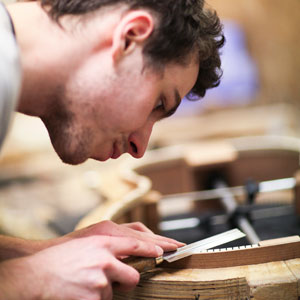 Many people are dissuaded from training in musical instrument making because of the cost, and therefore the make-up of the sector is not truly representative of the mix of backgrounds that make up the UK as a whole. This bursary has been set up to help cover or subsidise the cost of training for someone who would otherwise be prevented from pursuing this career path as a result of the cost.
Many people are dissuaded from training in musical instrument making because of the cost, and therefore the make-up of the sector is not truly representative of the mix of backgrounds that make up the UK as a whole. This bursary has been set up to help cover or subsidise the cost of training for someone who would otherwise be prevented from pursuing this career path as a result of the cost.
You could be just starting out on your journey in musical instrument making or at the point where you want to turn a hobby into a career, or you could already be a maker who is looking to further refine your skills.
Musical instrument crafts can include, but are not limited to, the making of complete instruments (such as bagpipes, guitars, steel pans and so on ), or to the specific skills that go into making an instrument (such as strings, valves, keys and so on).
If you are new to a craft and are struggling to find the right training for you, after your own research, please get in touch and we may be able to support. Successful applicants will be supported by the Heritage Crafts team to develop an action plan. We will work with you to monitor progress and support you to achieve your aims.
What can this grant be used for?
There are a number of routes to learning a craft skill. Applicants can apply for a grant for any amount up to £4,000 which can cover or contribute towards:
- the costs of training with a craftsperson;
- the costs of attending a specialist training course;
- the costs of attending an accredited training course;
- undertaking a self-directed programme of training with one or more craftspeople;
- the cost of specialist tools or materials, books or study materials or low cost travel (no more than 25% of total budget).
The bursary cannot be used for general living expenses, research, promotional activities or anything else. Successful applicants will be supported by the Heritage Crafts team. We will work with to you monitor progress and support you to achieve your aims.
How to apply
Please apply by filling out the form below. We will also accept a video application of no more than 15 minutes in length in which you address all of the questions in the form below. You can access a list of questions here.
The deadline for applications is 5pm on Friday 23 February 2024. If you have any questions or need assistance with the application process, please email Tess Osman at tess@heritagecrafts.org.uk.
Assessment, shortlisting and final selection will be carried out by the Heritage Crafts judging team, and interviews will be carried out by Zoom. If you are new to a craft and you would like assistance with finding a trainer, please get in touch and we will do what we can to help.
Deadline: 5pm on Friday 23 February 2024
 This training bursary is targeted at trainees and prospective trainees of fashion textile crafts who are experiencing financial hardship. It is sponsored by The Costume Society and is one of a suite of awards and bursaries offered by Heritage Crafts to support and celebrate heritage craftspeople.
This training bursary is targeted at trainees and prospective trainees of fashion textile crafts who are experiencing financial hardship. It is sponsored by The Costume Society and is one of a suite of awards and bursaries offered by Heritage Crafts to support and celebrate heritage craftspeople.
Apply for up to £4,000 to start training in a fashion textile craft or to further develop your skills.
 Many people are dissuaded from training in fashion textile crafts because of the cost, and therefore the make-up of the sector is not truly representative of the mix of backgrounds that make up the UK as a whole. This bursary has been set up to help cover or subsidise the cost of training for someone who would otherwise be prevented from pursuing this career path as a result of the cost.
Many people are dissuaded from training in fashion textile crafts because of the cost, and therefore the make-up of the sector is not truly representative of the mix of backgrounds that make up the UK as a whole. This bursary has been set up to help cover or subsidise the cost of training for someone who would otherwise be prevented from pursuing this career path as a result of the cost.
You could be just starting out on your journey in fashion textile crafts or at the point where you want to turn a hobby into a career, or you could already be a maker who is looking to further refine your skills.
Fashion textile crafts can include, but are not limited to, dressmaking, tailoring, pattern cutting, hat making, millinery, glovemaking, fabric pleating, corset making, and so on. Applications for training that prioritises the acquisition of practical hand skills will be favoured over training that is predominantly theoretical or design-oriented.
If you are new to a craft and are struggling to find the right training for you, after your own research, please get in touch and we may be able to support. Successful applicants will be supported by the Heritage Crafts team to develop an action plan. We will work with you to monitor progress and support you to achieve your aims.
What can this grant be used for?
There are a number of routes to learning a craft skill. Applicants can apply for a grant for any amount up to £4,000 which can cover or contribute towards:
- the costs of training with a craftsperson;
- the costs of attending a specialist training course;
- the costs of attending an accredited training course;
- undertaking a self-directed programme of training with one or more craftspeople;
- the cost of specialist tools or materials, books or study materials or low cost travel (no more than 25% of total budget).
The bursary cannot be used for general living expenses, research, promotional activities or anything else. Successful applicants will be supported by the Heritage Crafts team. We will work with to you monitor progress and support you to achieve your aims.
- Bursaries will be only awarded to crafts used in the creation of garments and accessories that include a substantial element of textiles.
- Fabric textile production is eligible if it is intended for garment and accessory making, but not for things like upholstery or tapestry.
- Footwear production that involves stitching is eligible.
- Hat making and millinery are eligible.
- Wig making is eligible, but only if it for costume.
- Button and fastening making and ribbon weaving are eligible, but only if they are for garments or accessories.
- Jewellery making is only eligible if it is of a type that is ineligible for our precious metal bursaries.
- Watchmaking is not eligible.
How to apply
Please apply by filling out the form below. We will also accept a video application of no more than 15 minutes in length in which you address all of the questions in the form below. You can access a list of questions here.
The deadline for applications is 5pm on Friday 23 February 2024. If you have any questions or need assistance with the application process, please email Tess Osman at tess@heritagecrafts.org.uk.
Assessment, shortlisting and final selection will be carried out by the Heritage Crafts judging team, and interviews will be carried out by Zoom. If you are new to a craft and you would like assistance with finding a trainer, please get in touch and we will do what we can to help.
 YEAR 2 THEME: ENDANGERED CRAFTS
YEAR 2 THEME: ENDANGERED CRAFTS
Deadline for applications: 12 February 2024
Online information session: 25 January 2024, 4pm
The Society of Antiquaries of London is partnering with Heritage Crafts for a second year to call for Heritage Crafts member craftspeople who practice endangered crafts to submit expressions of interest in becoming the 2024 Maker in Residence (MiR) at Kelmscott Manor, the former home of internationally renowned writer, designer-craftsman, conservationist and revolutionary socialist, William Morris.
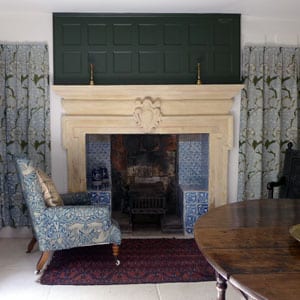 For 25 years everything about the 17th-century Manor was of profound inspiration to William Morris. Both the Manor and its setting in rural Oxfordshire were a fertile source of ideas, influencing his art, literature and social thinking as well as his passionate, imaginative engagement with history and nature. Integral to Morris’s ethos was his tireless championing of heritage crafts and the handmade. Morris’s values have never been more relevant than they are today.
For 25 years everything about the 17th-century Manor was of profound inspiration to William Morris. Both the Manor and its setting in rural Oxfordshire were a fertile source of ideas, influencing his art, literature and social thinking as well as his passionate, imaginative engagement with history and nature. Integral to Morris’s ethos was his tireless championing of heritage crafts and the handmade. Morris’s values have never been more relevant than they are today.
As part of the Society of Antiquaries’ NLHF-funded £6 million Kelmscott and Morris: Past, Present and Future project, the Kelmscott Manor residency is a unique opportunity for the successful candidate to reflect Morris’s advocacy of the handmade and contribute to his legacy by playing a distinctive part in the Manor’s programme of public engagement.
This year (2024) will see the second of three residencies by members of Heritage Crafts, and for this year will focus specifically on ‘endangered’ and ‘critically endangered’ crafts as featured in the 2023 edition of the Red List of Endangered Crafts (https://heritagecrafts.org.uk/redlist). The project presents an opportunity to showcase endangered crafts in an iconic rural setting visited annually by over 27,000 people. At the heart of the ‘new’ Kelmscott Manor is our determination to reflect William Morris’s inclusivity: ‘I do not want art for a few, any more than education for a few or freedom for a few’, by building its appeal and accessibility to a wider base of audiences through providing the richest experience possible.
What we are looking for
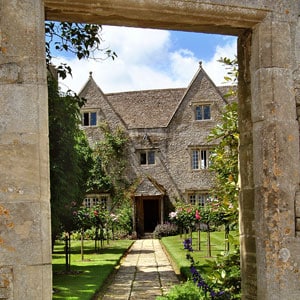 William Morris once described Kelmscott Manor’s beauty and atmosphere as very stimulating to the imagination. We are seeking an MiR who will be as inspired by it as Morris was over 150 years ago, and who can inspire and enthuse others by encouraging creative engagement. The MiR will be a professional working in an endangered craft that features in the 2023 edition of the Red List; we are keen to emphasise to potential applicants that our interest is not limited to practitioners of one of the crafts Morris himself was interested in or practiced.
William Morris once described Kelmscott Manor’s beauty and atmosphere as very stimulating to the imagination. We are seeking an MiR who will be as inspired by it as Morris was over 150 years ago, and who can inspire and enthuse others by encouraging creative engagement. The MiR will be a professional working in an endangered craft that features in the 2023 edition of the Red List; we are keen to emphasise to potential applicants that our interest is not limited to practitioners of one of the crafts Morris himself was interested in or practiced.
The MiR will be a practitioner with the ability to recognise and mediate the unique qualities of Kelmscott and the legacy of Morris’s life and work here. It is important that they have excellent communication skills and enjoy working with people. Experience of working in an educational context would be an advantage. The MiR will need to adapt to working on a small and busy site; although they will wherever possible be supported by staff and/or volunteers, they must also be confident in working on their own.
What we’ll ask of you
- a commitment to work in residence at Kelmscott Manor, responding creatively to the Manor and/or its site and setting
- a commitment of 25 days’ scheduled attendance on site, spread between April and the end of October 2024. These will incorporate getting to know the estate and collections; preparing and creating work; delivering the activities stated below.
- to provide a minimum of FOUR family-friendly workshops on Open Days (Thur, Fri, Sat)
- to provide a minimum of FOUR demonstrations on Open Days (Thur, Fri, Sat)
- to provide a minimum of TWO workshops for school or community groups (Mon, Tues) or produce resources for use by those groups
- to work in collaboration with the Manor to create ONE digital asset
- to create ONE asset (to be completed by 1 September) to be retained by the Manor (in the collections, including Learning & Outreach) or for disposal for fundraising purposes to benefit the Learning & Outreach Programme.
In return
The successful applicant will be offered a Residency over a period of seven months (April to the end of October 2024). This is an exciting opportunity for the MiR to foster a wider understanding of their craft and its heritage significance, to develop their practice and create new work whilst based at a site of international renown.
- The MiR will be paid a fee of £300 per day (a proportion of the fee can be paid in advance)
- £2,500 is available towards the cost of materials
- An additional £3,000 is available towards travel/accommodation (to be claimed retrospectively on a monthly basis)
- The MiR will be provided with a (fully accessible) small studio space with sink in the Learning Barn at the Manor
- The equivalent of TWO days’ dedicated time with the Curator, who for research purposes can provide access to archive material and collections in store
Practicalities
The pattern for the residency is entirely flexible and will depend on the successful proposal. We ask that a substantial proportion of time will be spent in or around the Manor and site. As the Manor is a Grade I Listed Building certain site restrictions may apply. The project partners will seek to facilitate the MiR’s wishes where possible; however these restrictions should be recognised from the outset.
The majority of the buildings have step-free access, including the Learning Barn where the MiR will have their studio space. There is step-free access to the ground floor of the Manor, but access to the upper floors are via stairs only. We are committed to supporting any access requirements of the MiR and ensuring that there are no barriers to participation in the residency.
An agreement setting out the residency outcomes and commitments will be discussed and agreed with the successful candidate in advance of the residency commencing. A DBS check will be required.
Management
On a day-to-day basis the project will be managed by Hannah Britton (Learning & Outreach Officer) and Carrie Marks (Visitor & Volunteer Manager).
Timetable
- Online information session about Kelmscott Manor and the Residency – 25 January 2024, 4pm to 5pm (to attend please register here)
- Deadline for applications – 12 February 2024
- Interviews (to be held at Kelmscott Manor) – 4 March 2024
- Appointment of MiR – 1 April 2024
- Residency period – flexible between April and end of October 2024
Who is eligible to apply
- Residents of the UK
- Aged 18 and above
- Member of Heritage Crafts (click here to become a member for £20 a year)
- Practice an ‘endangered’ or ‘critically endangered’ crafts as featured in the 2023 edition of the Red List of Endangered Crafts
- Have at least THREE years’ experience in your chosen craft
Information session
We will be running an information session to provide more details about Kelmscott Manor and Morris’ legacy, and to answer any of your questions, on Zoom on Thursday 25 January 2024, 4pm to 5pm. To attend please register here: https://zoom.us/meeting/register/tJcqc-muqDsvHtxGWLN91T86Y0mMYLcDs__n#/registration
Application procedure
Your application should consist of a 1-page proposal, a 1-page curriculum vitae and up to 6 images of recent work. Please also include the name and address of two referees, at least one of whom should be a professional contact.
Applications should be emailed to Kathy Haslam (kathyhaslam@kelmscottmanor.org.uk) and Hannah Britton (hannah.britton@kelmscottmanor.org.uk).
Please ensure your application email has ‘Maker in Residence’ in the subject line and that it is sent to both of the contact emails specified here. The deadline for applications is 12 February 2024. If you encounter any difficulties with the application process, please contact Kathy or Hannah via email or telephone on 01367 252486.
 Heritage Crafts and the Costume Society have joined forces to launch two training bursaries to ensure that new and early-career fashion textile makers have the skills they need to succeed.
Heritage Crafts and the Costume Society have joined forces to launch two training bursaries to ensure that new and early-career fashion textile makers have the skills they need to succeed. They could be just starting out on your journey in fashion textiles, or at the point where they want to turn a hobby into a career, or they could already be a maker or designer who is looking to further develop their hand skills.
They could be just starting out on your journey in fashion textiles, or at the point where they want to turn a hobby into a career, or they could already be a maker or designer who is looking to further develop their hand skills.

 This training bursary is targeted at trainees and prospective trainees of crafts involving precious metals who are experiencing financial hardship. It is sponsored by The Royal Mint and is
This training bursary is targeted at trainees and prospective trainees of crafts involving precious metals who are experiencing financial hardship. It is sponsored by The Royal Mint and is  Many people are dissuaded from training in precious metal heritage crafts because of the cost, and therefore the make-up of the sector is not truly representative of the mix of backgrounds that make up the UK as a whole. This bursary has been set up to help cover or subsidise the cost of training for someone who would otherwise be prevented from pursuing this career path as a result of the cost.
Many people are dissuaded from training in precious metal heritage crafts because of the cost, and therefore the make-up of the sector is not truly representative of the mix of backgrounds that make up the UK as a whole. This bursary has been set up to help cover or subsidise the cost of training for someone who would otherwise be prevented from pursuing this career path as a result of the cost. Deadline: 5pm on Friday 23 February 2024
Deadline: 5pm on Friday 23 February 2024 Many people are dissuaded from training in musical instrument making because of the cost, and therefore the make-up of the sector is not truly representative of the mix of backgrounds that make up the UK as a whole. This bursary has been set up to help cover or subsidise the cost of training for someone who would otherwise be prevented from pursuing this career path as a result of the cost.
Many people are dissuaded from training in musical instrument making because of the cost, and therefore the make-up of the sector is not truly representative of the mix of backgrounds that make up the UK as a whole. This bursary has been set up to help cover or subsidise the cost of training for someone who would otherwise be prevented from pursuing this career path as a result of the cost. Many people are dissuaded from training in fashion textile crafts because of the cost, and therefore the make-up of the sector is not truly representative of the mix of backgrounds that make up the UK as a whole. This bursary has been set up to help cover or subsidise the cost of training for someone who would otherwise be prevented from pursuing this career path as a result of the cost.
Many people are dissuaded from training in fashion textile crafts because of the cost, and therefore the make-up of the sector is not truly representative of the mix of backgrounds that make up the UK as a whole. This bursary has been set up to help cover or subsidise the cost of training for someone who would otherwise be prevented from pursuing this career path as a result of the cost. YEAR 2 THEME: ENDANGERED CRAFTS
YEAR 2 THEME: ENDANGERED CRAFTS For 25 years everything about the 17th-century Manor was of profound inspiration to William Morris. Both the Manor and its setting in rural Oxfordshire were a fertile source of ideas, influencing his art, literature and social thinking as well as his passionate, imaginative engagement with history and nature. Integral to Morris’s ethos was his tireless championing of heritage crafts and the handmade. Morris’s values have never been more relevant than they are today.
For 25 years everything about the 17th-century Manor was of profound inspiration to William Morris. Both the Manor and its setting in rural Oxfordshire were a fertile source of ideas, influencing his art, literature and social thinking as well as his passionate, imaginative engagement with history and nature. Integral to Morris’s ethos was his tireless championing of heritage crafts and the handmade. Morris’s values have never been more relevant than they are today. William Morris once described Kelmscott Manor’s beauty and atmosphere as very stimulating to the imagination. We are seeking an MiR who will be as inspired by it as Morris was over 150 years ago, and who can inspire and enthuse others by encouraging creative engagement. The MiR will be a professional working in an endangered craft that features in the 2023 edition of the Red List; we are keen to emphasise to potential applicants that our interest is not limited to practitioners of one of the crafts Morris himself was interested in or practiced.
William Morris once described Kelmscott Manor’s beauty and atmosphere as very stimulating to the imagination. We are seeking an MiR who will be as inspired by it as Morris was over 150 years ago, and who can inspire and enthuse others by encouraging creative engagement. The MiR will be a professional working in an endangered craft that features in the 2023 edition of the Red List; we are keen to emphasise to potential applicants that our interest is not limited to practitioners of one of the crafts Morris himself was interested in or practiced.
